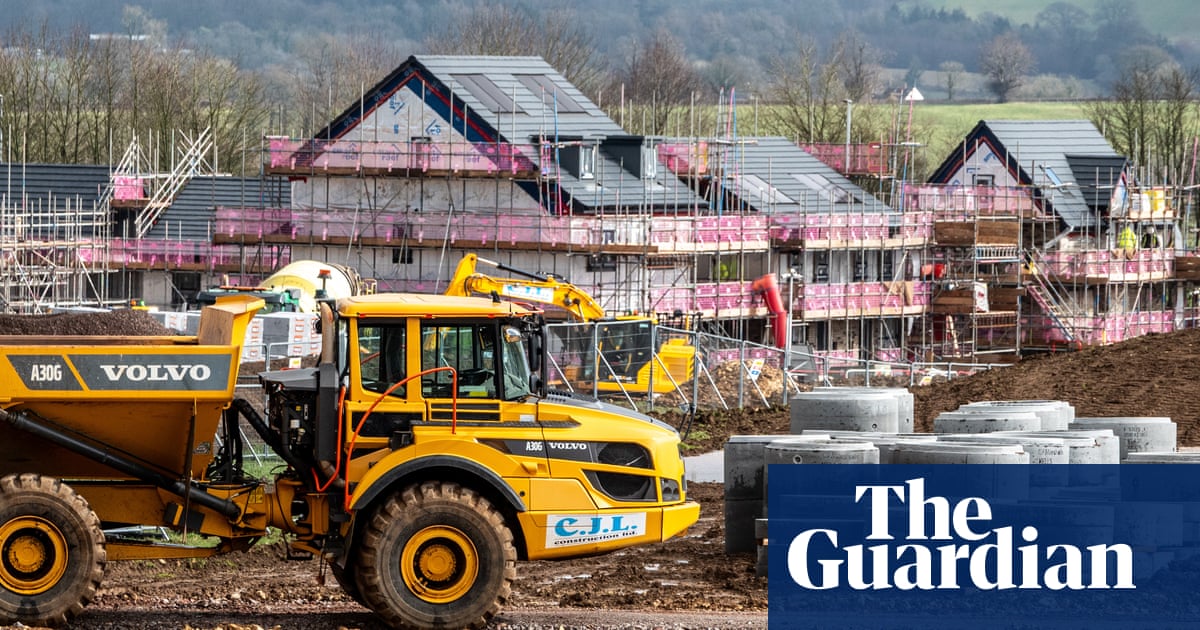Labour MPs are planning to rebel over the planning and infrastructure bill after constituents raised concern that it threatens protected habitats and wildlife.
The Guardian understands that about two dozen Labour MPs are calling for ministers to force developers to build more than a million homes for which they already have planning permission before pushing through legislation that rolls back environmental protections for the most protected habitats in England.
Ministers are understood to be drawing up amendments to the most controversial part of the bill, part three, in an apparent scramble to head off a rebellion and quell the anger of respected wildlife groups, whose membership is many millions strong.
Sources close to the discussions said there were red lines that could not be crossed to make sure nature was protected.
Alexa Culver, an environmental lawyer with RSK Wilding, said ministers were expected soon to present “appeasement” amendments on part three so they could claim the legislation was not regressive.
She said: “We should assume that ministers won’t have sought the advice of the Office for Environmental Protection (OEP) on these amendments. I urge us all to call for a further legal opinion from the OEP so that misleading ministerial statements aren’t allowed to stay in circulation for too long.”
The Guardianrevealed on Tuesdaythat three separate legal opinions – including the OEP’s – say the bill rolls back environmental protections, including for more than 5,000 of the most sensitive, rare and protected habitats in England, leaving them vulnerable to destruction. Wildlife charities are calling on the government to scrap part three and redraw the bill when it returns to parliament on Monday.
Beccy Speight, the chief executive of the RSPB, said: “The government must stop portraying this planning bill as a win-win for nature and economic growth. It is not. A thriving natural world is essential to underpin both growth and a resilient future. It’s not too late for the government to address the issues with part three of the bill, and put forward legislation that can actually deliver economic growth and restore nature at scale.”
Property developers have yet to build 1.4m homes for which they have planning permission. In a tactic known as landbanking, developers hold land with planning permission to secure higher values, according to recent research by theInstitute for Public Policy Research(IPPR).
Chris Hinchliff, the Labour MP for North East Hertfordshire, said that rather than pushing through a bill that allowed developers to pay to sidestep environmental protections, ministers should force developers to start building the homes they already had permission for.
Hinchliff hassubmitted a number of amendmentsto the bill aiming to strengthen protections for nature. He said: “This legislation strips back environmental protections and local democracy but does nothing to stop developers drip-feeding developments to inflate prices. The planning system consistently approves more homes than get built. The bottleneck isn’t simply process, it’s profit.”
The rebel backbenchers are working with the Green party and the Liberal Democrats to form a large group that hopes to scupper part three of the bill, which they say is the most damaging, when the legislation comes to parliament next week.
Part three allows developers to sidestep environmental obligations by paying into a nature restoration fund, for environmental improvements elsewhere at a later date.
The planning and infrastructure bill is central to the government’s growth strategy, with a target to build 1.5m homes by the end of this parliament to address the UK’shousing affordability crisisand drive economic growth.
Ministersannounced recentlythat they were consulting on a range of measures to get developers building, including considering a use-it-or-lose-it policy, which was recommended by the IPPR in its report in February.
IPPR research shows that planning rules have been loosened over the past two decades but building rates have decreased during that time.
Hinchliff said there should a fresh approach to deal with underperforming developers. “I’ve proposed financial penalties for developers who don’t build as promised, and new powers for councils to block developments from firms which repeatedly land bank,” he said.
Terry Jermy, the Labour MP for South West Norfolk, said: “Ensuring that homes with planning permission get built in a timely manner is part of the solution to our housing needs. There’s a housing shortage in the country, which is costing local councils and the government huge sums of money in emergency and temporary accommodation, and the dream of home ownership remains out of reach for many. Tackling landbanking needs to form part of the government’s focus to bring about the change needed.”
Dr Maya Singer Hobbs, a senior research fellow at IPPR, said: “Developers are not deliberately building slowly to stymie housebuilding, but they are not going to build at a rate that will reduce house prices – it’s not in their interest to do this, and indeed they have legal obligations to shareholders that would prevent this. There might be a case to explore whether giving local authorities the power to apply a ‘use it or lose it’ approach to planning permission would speed up delivery.”
